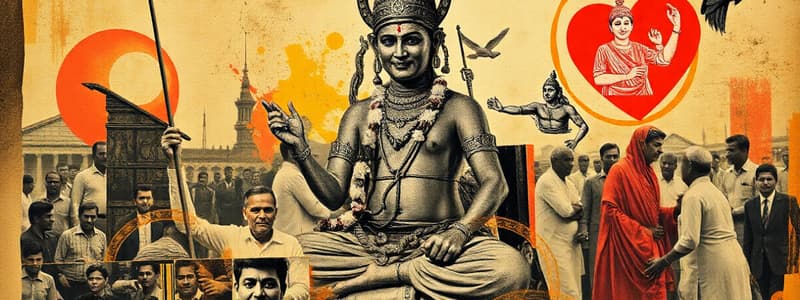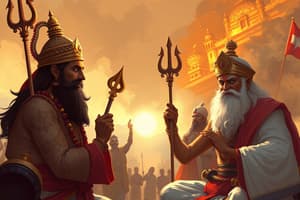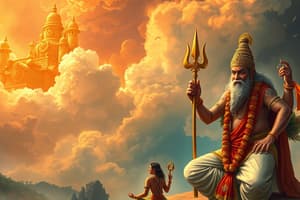Podcast
Questions and Answers
According to Savarkar, what makes the term 'Hindutva' so difficult to analyze?
According to Savarkar, what makes the term 'Hindutva' so difficult to analyze?
The numerous and diverse sentiments centered around the name make it difficult to analyze.
What is the key distinction between Hindutva and Hinduism?
What is the key distinction between Hindutva and Hinduism?
Hindutva is presented as a broader concept encompassing all aspects of Hindu identity, while Hinduism is seen as a subset, specifically related to religious or spiritual practices.
How does Savarkar explain the origin of the name 'Hindu' in relation to the rivers in India?
How does Savarkar explain the origin of the name 'Hindu' in relation to the rivers in India?
Savarkar suggests that the name 'Hindu' is derived from the Sapta Sindhu (seven rivers) region, with the term evolving from the local inhabitants' and surrounding nations' designation.
What, according to Savarkar, led to the overshadowing of the name 'Sindhus or Hindus' by newer names such as 'Kurus' and 'Magadhas'?
What, according to Savarkar, led to the overshadowing of the name 'Sindhus or Hindus' by newer names such as 'Kurus' and 'Magadhas'?
What role did the institution of 'Chakarvartin' play in the context of national and cultural unity, as mentioned in the text?
What role did the institution of 'Chakarvartin' play in the context of national and cultural unity, as mentioned in the text?
How does the text explain the adoption and survival of the name 'Hindu' despite the existence of other names for India, such as 'Bharatavarsha'?
How does the text explain the adoption and survival of the name 'Hindu' despite the existence of other names for India, such as 'Bharatavarsha'?
According to Savarkar, how did the rise of Buddhism influence India's international life and the prominence of the name 'Hindu'?
According to Savarkar, how did the rise of Buddhism influence India's international life and the prominence of the name 'Hindu'?
What political consequence of the Buddhistic expansion is indicated as influential on the fall of Buddhism?
What political consequence of the Buddhistic expansion is indicated as influential on the fall of Buddhism?
In the context of the text, what does the author suggest regarding the relationship between 'valour' and 'formulas' in ancient India?
In the context of the text, what does the author suggest regarding the relationship between 'valour' and 'formulas' in ancient India?
How did the leaders of thought and action react to the events that led to the fall of Buddhism and why was it a necessity?
How did the leaders of thought and action react to the events that led to the fall of Buddhism and why was it a necessity?
What was the significance of the system of four 'varnas' in ancient India?
What was the significance of the system of four 'varnas' in ancient India?
Why does the author consider the commingling of races on the north-western side of the nation to be unhealthy?
Why does the author consider the commingling of races on the north-western side of the nation to be unhealthy?
What is the significance of Shalivahan's royal decree to demarcate the boundaries between India and other non-Indian nations?
What is the significance of Shalivahan's royal decree to demarcate the boundaries between India and other non-Indian nations?
Besides being Vedic, what curious advantage did the epithet Sindhusthan possess?
Besides being Vedic, what curious advantage did the epithet Sindhusthan possess?
What is the Royal Decree that shows the connection between being an Arya and an aversion to Mleccha?
What is the Royal Decree that shows the connection between being an Arya and an aversion to Mleccha?
What does the author say about what happens when all the details share a connection in terms of the Hindu sanskriti?
What does the author say about what happens when all the details share a connection in terms of the Hindu sanskriti?
According to the document, what is a necessary detail of who can be considered Hindu and what do people owe to it?
According to the document, what is a necessary detail of who can be considered Hindu and what do people owe to it?
What constitutes the essence of a Hindu and what does it mark people as?
What constitutes the essence of a Hindu and what does it mark people as?
How did being on this side of the Indus lead to being able to use the word hindusthan?
How did being on this side of the Indus lead to being able to use the word hindusthan?
What does the author say about someone whose heart has been touched?
What does the author say about someone whose heart has been touched?
How clear is it said that a suspicion is singularly stupid and what after it seems?
How clear is it said that a suspicion is singularly stupid and what after it seems?
In times of conflict, what do nations lose and who should not be forgotten?
In times of conflict, what do nations lose and who should not be forgotten?
What is needed to inspire respect for a name?
What is needed to inspire respect for a name?
What does our great Guru triumphantly exclaim?
What does our great Guru triumphantly exclaim?
What does the author say about the importance of each' syllable?
What does the author say about the importance of each' syllable?
A Shudra can become a brahman, but what does the author say not to call that?
A Shudra can become a brahman, but what does the author say not to call that?
What key message is the author trying to get across with the piece?
What key message is the author trying to get across with the piece?
What happens if Hindus consolidate and strengthen Hindu nationality?
What happens if Hindus consolidate and strengthen Hindu nationality?
Flashcards
What is Hindu?
What is Hindu?
The name given to the Indus River by original inhabitants.
What does Hindutva embrace?
What does Hindutva embrace?
Embraces all departments of thought and activity of the Hindu race.
Association of word with thing...
Association of word with thing...
Signifies grows stronger and lasts long.
What is Hindutva?
What is Hindutva?
Signup and view all the flashcards
What is Hinduism?
What is Hinduism?
Signup and view all the flashcards
When did Sindhus mission reach its limit?
When did Sindhus mission reach its limit?
Signup and view all the flashcards
What did Aryawarta and Bramhawarta express?
What did Aryawarta and Bramhawarta express?
Signup and view all the flashcards
What does Vishu Puran say about Bharata?
What does Vishu Puran say about Bharata?
Signup and view all the flashcards
Sindhu Sauveers
Sindhu Sauveers
Signup and view all the flashcards
What is Sindhu Rashtra?
What is Sindhu Rashtra?
Signup and view all the flashcards
Hindusthani Language
Hindusthani Language
Signup and view all the flashcards
Sword in Sindhusthan
Sword in Sindhusthan
Signup and view all the flashcards
During prolonged conflict
During prolonged conflict
Signup and view all the flashcards
Yuan Chwang identifies Hindus with what?
Yuan Chwang identifies Hindus with what?
Signup and view all the flashcards
Living in the land of dreams
Living in the land of dreams
Signup and view all the flashcards
What about word Hindu in Sanskrit?
What about word Hindu in Sanskrit?
Signup and view all the flashcards
What did leaders complain about bitterely?
What did leaders complain about bitterely?
Signup and view all the flashcards
Who gets hurt?
Who gets hurt?
Signup and view all the flashcards
Holyland
Holyland
Signup and view all the flashcards
Being Hindu
Being Hindu
Signup and view all the flashcards
So many different isms why have them?
So many different isms why have them?
Signup and view all the flashcards
Why is it there is a cost
Why is it there is a cost
Signup and view all the flashcards
Systems in play with the many.
Systems in play with the many.
Signup and view all the flashcards
Study Notes
What is in a name
- The name should reflect the importance of the object, idea, or concept it represents
- Names that become deeply intertwined with complex ideas or ideals take on as much significance as the things they represent
- Choosing a name involves making a significant decision, especially selecting one of two options or when the connection is simple
- The name Hindutva carries deep meaning and inspiration, requiring thorough examination
Hindutva is different from Hinduism
- Hindutva has inspired a wide range of rich, potent, subtle, and elusive ideas and sentiments, making it difficult to define precisely
- It has gradually developed over at least four centuries through the actions of prophets, poets, law-givers, heroes, and historians
- Hindutva encompasses race's experiences, with spirituality mistaken for other religions such as Hinduism
- Understanding Hindutva requires clarifying it, or Hinduism remains vague, leading to misunderstandings among related communities within Hindu civilization
- 'Hinduness' might be a better name because ‘ism’ generally alludes to spiritual, religious dogma, or creed
- Hindutva includes all facets related to the Hindu race, and this term necessitates understanding of the word Hindu to appreciate its imperial sway
What is a Hindu
- It is likely that long before the ancient Egyptians and Babylonians built their civilizations, the first Aryan sacrificial fires burned along the Sindhu, or Indus River
- Vedic hymns resounded as the spiritual fervour invigorated the souls of those people with adventure and sublime thoughts, setting them to build a great civilization
- The Aryans distanced themselves from their neighbors & Persians, spreading along the seven rivers Sapta Sindhus, developing a sense of nationality by giving it "a local habitation and a name."
- They were grateful to the waterways networking the region, considering them nerve threads, calling themselves Sapta Sindhus, per the Rigveda
- The love and veneration harbored for the River, the Sindhu, symbolizes the shared nationality and culture
Name older still
- Indians moving met rivers as genial and fertilizing but could not forget the Sapta Sindhus, welding the nation, voicing national, cultural unity
- Through today, Sindhu, a Hindu, remembers the rivers gratefully, symbolically, to refresh and cleanse
- Not only were people known to themselves as 'Sindhus', but other surrounding nations also had records under that name, 'Sapta Sindhu'
- The letter changes from 's' in Sanskrit to 'h' in some Prakrit & non-Indian languages, such as the word Sapta changing to Hapta
- The Vedic nation Sapta Sindhu was called Hapta Hindu by ancient Persian people in the Avesta at the very dawn of history
- The Puranas state that many of the languages spoken by Mleccha originate from Sanskrit
Hindus, a nation
- Their great mission and Sacrificial Fire spurred intrepid Sindhus/Hindus onward across Panchanad/Punjab, reclaiming lands, felling forests, boosting agriculture and founding cities
- While achieving feats, the Aryans loosely centralized themselves to suit individualistic tendencies and new environments
- As colonies grew distant different settlements became self-governed, reinforcing newer political connections without erasing the old ones
- Ancient generalizations and names waned as Kurus, Kashis, Videhas and Magadhas rose, overshadowing the Sindhus/Hindus
- Despite vanishing nationwide cultural unity, the concept still lived on, politically forming as a Chalravartin
- The Sindhus founding of a nation and country geographically maxed out when Ayodhya's Prince reached Ceylon, dominating the Himalayas to the Seas
- With Ayodhya unchallenged as The Horse of Victory's and Ramchandra's Imperial Throne's white Umbrella unfurled, a loving allegiance was sworn by Aryan Princes, Hanuman, Sugriva, and Bibhishana on that national day
- Aryans and Anaryans knitting into one politically crowned efforts summing up generations
Other names
- Expressing a synthetic conception gains strength with a comprehensive term, Aryawarta or Bramhawarta being unsuited to the synthesis joining the Indus to the sea to weld a nation
- The ancient writers defined Aryawarta as lying between the Himalayas and the Vindhya, which was unsuited to common people who had carried cultural empire beyond bending Vindhayadri
- As Vedic Bharat ruled the world, a term to express Indian Nation came from it, which people of Aryawarta and Daxinapatha called motherland/ cultural empire
- Shifting gravitation south, Saptasindhu, Aryawart, Daxinapath gave way to politically grander Bharatkhanda, drawing vast conceptions in our great thinkers' minds
- The terse Vishu Puran couplet defines the position of our people, stating, 'The land which is to the north of the sea and to the south of the Himalaya mountain is named Bharata inhabited by the descendants of are Bharata
How Names Are Given
- Bharatavarsha did not erase the cradle name Sindhus or Hindus, or the love to River of rivers (the Sindhu) to which Patriarchs and people suckled at its breast
- The frontier provinces bordering Indus still clung to the ancient name Sindhu Rashtra, and throughout Sanskrit literature we find Sindhu Sauveers
- The Sindhu Rashtra limits shifted by language spoken, which does and did mark them as their own, and the name 'Sindhi' (an emphatic reminder of unit amongst Indian people)
- Although Bharatakhand overshadowed India's cradle name, foreign nations seem uncaring, as immediate neighbors (Avestic Persians, Hebrews, Greeks, etc.) clung to Sindhus/Hindus
- They indicated the borderland as the Indus from gone-by days, but also the whole nation, such as Persians know us as Hindus, Greeks as Indos, Europe, America, and lived alongside us so long as Shintus/Hintus
- The Parathians rarely forgot name and preferred new one "Bharat" with Afganisthan called Schweta Bharat
- The whole world knows us as Hindus and our land as Hindusthan, as if by wish of the Vedic fathers who made that choice
- A name is determined what others like, and when one comes to conflict Self needs a name. It is a game that is a community
- Chosen names shadow others if the world chooses us redolent of glory and early love, and also brought first into contact then conflict with the world as enabled 'Hindu' to asset itself as to push back the well-beloved name of Bharatakhanda itself
International life
- Post rise of Buddhism India's international life was considered to have increased due to political enterprise having exhausted expansion in Asia, and also communications from the outsiders becoming more than before
- Very divine mission wheel of justice made India the heart of all world and millions of human Misar to Mexico came to land of Sindhus & Godmen
- Thousands of pilgrims from distant shores invaded, along with scholars, preachers and saints, to rendered epithet of name most prominent
- Diplomacy with states who knew us as Hindus/Indus revive title to use by making incumbent
Fall of Buddhism
- One factor contributing to fall of Buddhism was politics. Though philosophical diffs between regions existed side-by-side, and though churches sheltered loose people on life pursuits, and were spiritual giants of Arhat & Bhikkus, it could not attract such fierce attention of India
- The Buddhistic expansion's political consequences were disastrous to virility in India, such as during the time of Shakya Sinha (when the news of fate to those was carried to Prince who was at laying foundation of Church
- Little Shakya Rebulic deprived best fell victim to those in Shakya Sinha's life, who would perhaps remain unaffected, but Hindus now drink with bitterness and politcal servitude at hands brutal violence soothe, while they accuse the great brotherhood
Buddhism - A universal religion
- Truly it was a law of Righteousness that had no ulterior end in view to make safe India to change her sword
- India declared to 'take more pleasure in the quest of peace and righteousness that in the conquest of arms,' where so long world was red in 'tooth and claw.'
- If India had to live life after spiritual rights of her should, she must not lose the strength of cohesion, where India felt sick of repeating the mumbos and jumbos
Then came reaction!
- Universialtendencies of buddhism only grew powerful as attempt to reëstablish power grew threatening
- Nationalist tendencies refused to barter independence, but if foreign invader happened to favor buddhusm, one could find sympathizers
- Dark hints abound how some foreign Buddhists has actual express aim, with puranas telling how war waged on Aryadesh by Nyanpati and allies, where Buddhusists lost
Studying That Suits You
Use AI to generate personalized quizzes and flashcards to suit your learning preferences.



